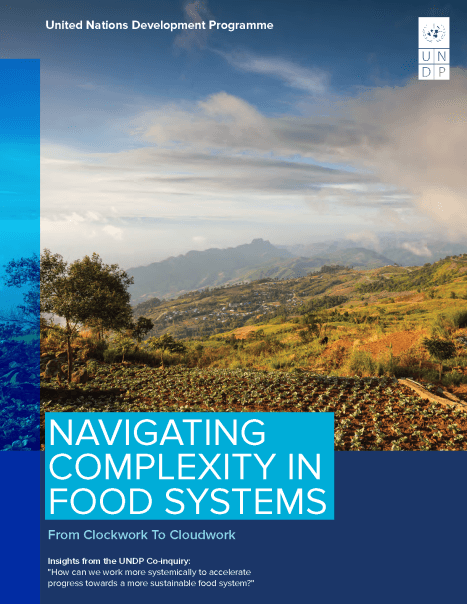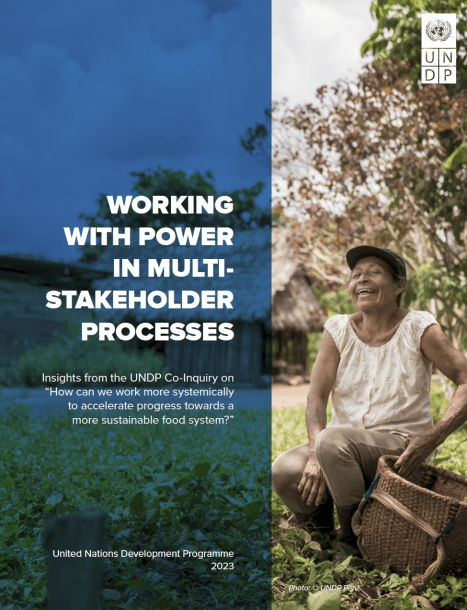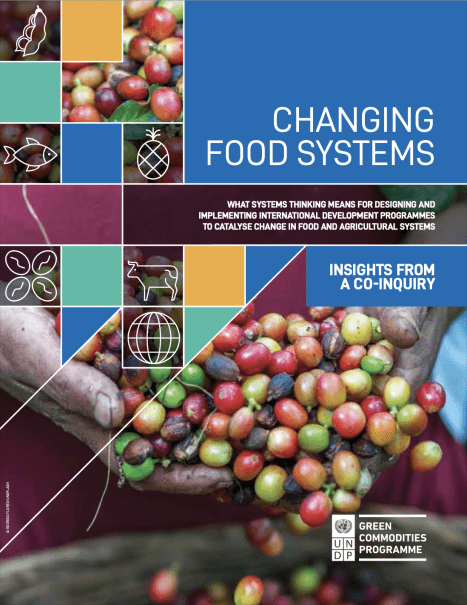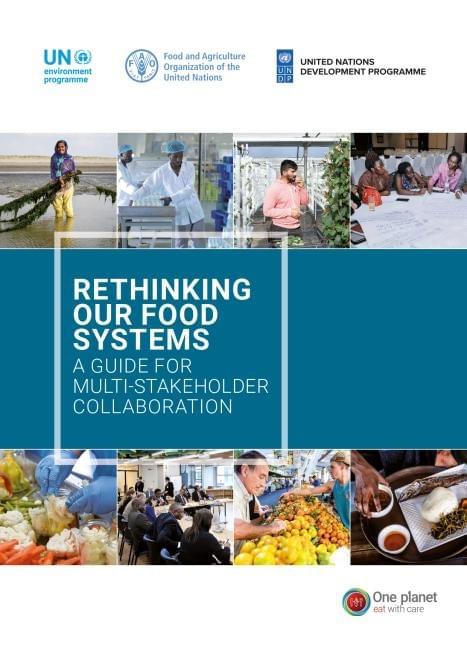
Building on Experience
& Evidence
From 2020 to 2022, UNDP conducted a series of "co-inquiry cycles" on the theme: How can we work more systemically to accelerate progress toward a more sustainable food system?
More than 150 representatives from multilateral and bilateral donors, development agencies, academia, civil society, and the private sector contributed.
The co-inquiry provided actionable recommendations for adopting more systemic, collaborative and adaptive approaches to development programming, with a particular focus on food systems, set out in the report Navigating Complexity in Food Systems: From Clockwork To Cloudwork.
C3 builds on these findings and the wider expertise in collaboration and systems approaches of UNDP, FAO, UNEP and Wageningen University & Research, particularly in relation to food-biodiversity-climate nexus issues

THE ADOPTION OF SYSTEM APPROACHES
According to the co-inquiry findings, the successful adoption of systems approaches, multi-stakeholder collaboration and adaptive management requires:
Building capacity in methodologies for working with complex adaptive systems, as well as the ‘inner capacities’ for ‘systems leadership’
Accelerating organisational change, including: breaking down silos and taking more multi- disciplinary approaches; adjusting organisational policies and procedures to be more agile and adaptive; strengthening organisational learning
Adopting more collaborative and adaptive approaches to program design and implementation, including: using more inclusive, participatory processes; supporting champions of change; putting learning at the heart of programs; taking a more flexible approach to planning and budgeting; developing portfolios of interventions
Changing the wider system incentives, particularly changing the donor requirements for planning, accountability and reporting to support more participatory, collaborative and adaptive approaches to change, and moving to towards systems financing models
THE ADOPTION OF SYSTEM APPROACHES
According to the co-inquiry findings, the successful adoption of systems approaches, multi-stakeholder collaboration and adaptive management requires:
- Building capacity in methodologies for working with complex adaptive systems, as well as the ‘inner capacities’ for ‘systems leadership’
- Accelerating organisational change, including: breaking down silos and taking more multi- disciplinary approaches; adjusting organisational policies and procedures to be more agile and adaptive; strengthening organisational learning
- Adopting more collaborative and adaptive approaches to program design and implementation, including: using more inclusive, participatory processes; supporting champions of change; putting learning at the heart of programs; taking a more flexible approach to planning and budgeting; developing portfolios of interventions
- Changing the wider system incentives, particularly changing the donor requirements for planning, accountability and reporting to support more participatory, collaborative and adaptive approaches to change, and moving to towards systems financing models
Explore the Findings
The reports below build on captured conversations and insights from the past several years
Navigating Complexity in Food Systems: From Clockwork To Cloudwork
Navigating Complexity in Food Systems: From Clockwork to Cloudwork is a call to action for international development organisations and all stakeholders committed to transform food systems, to shape a new vision that embraces complexity to deal with today’s growing challenges.
As part of a three-year co-inquiry process convened by UNDP, food systems practitioners gathered to discuss how can we work more systemically to accelerate progress towards a more sustainable food system. This report brings together their perspectives, insights and recommendations to inspire a shift from "clockwork" or linear approaches, to "cloudwork", a systemic and holistic approach to complex problems.
MARCH 25, 2024
Working with Power in Multi-Stakeholder Processes
This report provides a synthesis of insights from the discussions, particularly with regard to large, donor-funded programmes that are delivered by UN agencies, other multi-laterals and large international NGOs.
The insights and recommendations from the co-inquiry have application across donor funded projects in the food and agriculture sector but also have wider application across international development programmes that are seeking to catalyse systemic change to address a range of social and environmental challenges and therefore this report captures the lessons at this level.
SEPTEMBER 1, 2022
Changing Food Systems: Co-inquiry Cycle Two
This report provides a synthesis of insights from the discussions, particularly with regard to large, donor-funded programmes that are delivered by UN agencies, other multi-laterals and large international NGOs.
The insights and recommendations from the co-inquiry have application across donor funded projects in the food and agriculture sector but also have wider application across international development programmes that are seeking to catalyse systemic change to address a range of social and environmental challenges and therefore this report captures the lessons at this level.
SEPTEMBER 1, 2022
Rethinking our Food Systems: A Guide for Multi-stakeholder Collaboration
UNEP, FAO, and UNDP have come together to consolidate learnings and tools, gathered from within and beyond the three UN agencies in order to provide a practical guide for multi-stakeholder collaboration.
This guide is intended for institutions and facilitators responsible for leading multi-stakeholder initiatives that are inclusive of government and essential non-governmental actors committed to contributing to the sustainable transformation of food systems.
JUNE 21, 2023
We are a multi-partner collective led by UNDP (Global Food Systems Team of the UNDP Nature Hub), FAO, UNEP and Wageningen University & Research. Seed funding is provided by the Global Environment Facility. This visual presentation is for learning and information purposes only.
(c) 2025. All Rights Reserved. C3 Labs Comms & Brand World created by C3 Creatives in Residence Sophie Rucker & Max Lilley.






